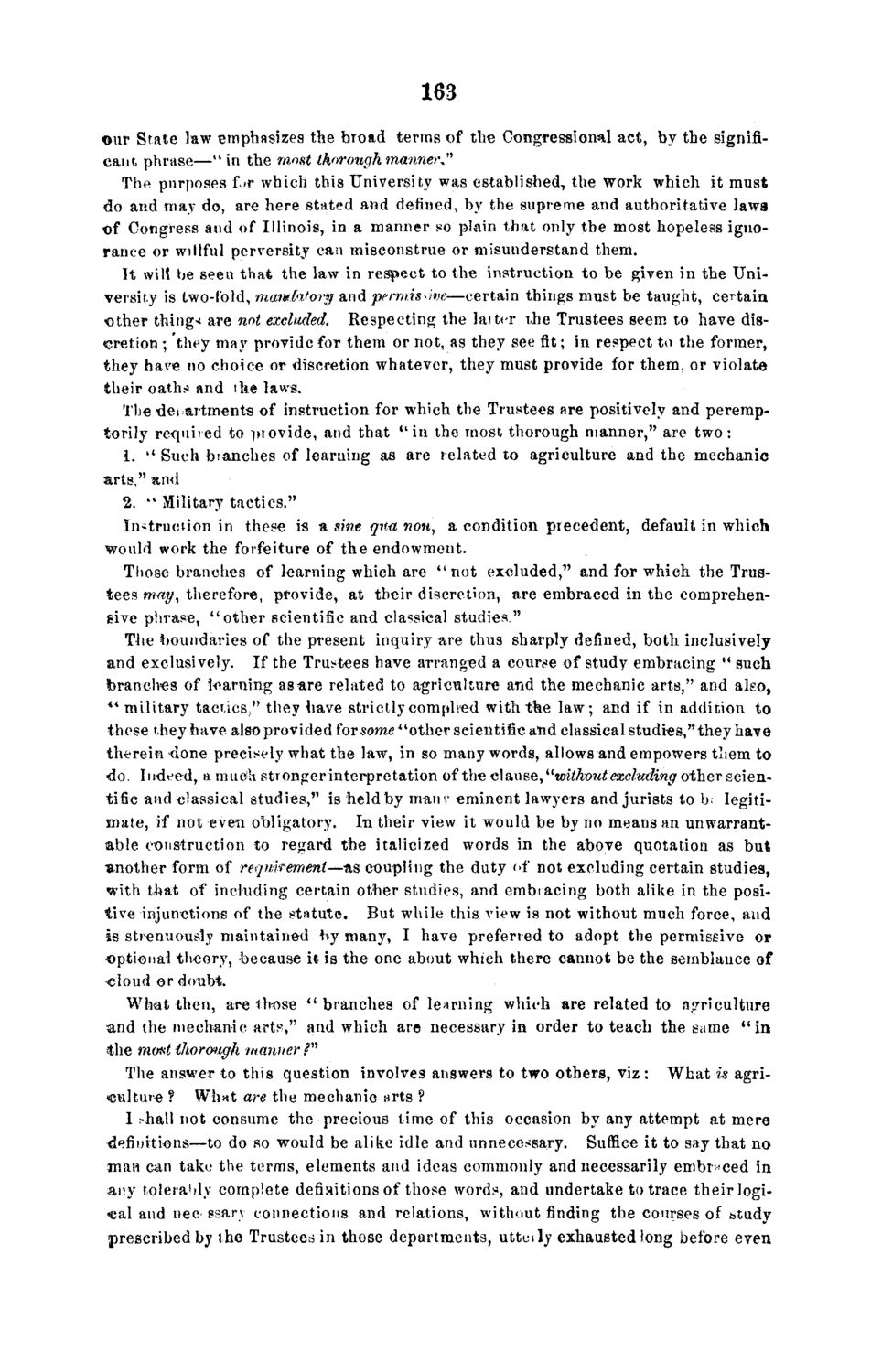| |
| |
Caption: Board of Trustees Minutes - 1868
This is a reduced-resolution page image for fast online browsing.

EXTRACTED TEXT FROM PAGE:
163 our State law emphasizes the broad terms of the Congressional act, by the significant phrase—"in the most thorough manner," The purposes f.>r which this University was established, the work which it must do and may do, are here stated and defined, by the supreme and authoritative lawa of Congress and of Illinois, in a manner so plain that only the most hopeless ignorance or willful perversity can misconstrue or misunderstand them. It will be seen that the law in respect to the instruction to be given in the University is two-fold, mamtatorg and permissive—certain things must be taught, certain other things are not excluded. Respecting the latt<*r the Trustees seem to have discretion; they may provide for them or not, as they see fit; in respect to the former, they have no choice or discretion whatever, they must provide for them, or violate their oaths and the laws. The departments of instruction for which the Trustees are positively and peremptorily requited to provide, and that " i n the most thorough manner," are two: 1. " Such branches of learning as are related to agriculture and the mechanic arts," and 2. " Military tactics." Instruction in these is a sine qua nony a condition precedent, default in which would work the forfeiture of the endowment. Those branches of learning which are " n o t excluded," and for which the Trustees mm/, therefore, provide, at their discretion, are embraced in the comprehensive phrase, "other scientific and classical studies." The boundaries of the present inquiry are thus sharply defined, both inclusively and exclusively. If the Trustees have arranged a course of study embracing " such branches of learning as are related to agriculture and the mechanic arts," and also, " military tactics/' they have strictly complied with the law; and if in addition to these they have also provided for some "other scientific and classical studies," they have therein done precisely what the law, in so many words, allows and empowers them to do. Indeed, a muck stronger interpretation of the clause, "without excluding other scientific and classical studies," is heldby man" eminent lawyers and jurists to b; legitimate, if not even obligatory. In their view it would be by no mean3 an unwarrantable construction to regard the italicized words in the above quotation as but •another form of requirement—as coupling the duty of not excluding certain studies, with that of including certain other studies, and embracing both alike in the positive -injunctions of the statute. But while this view is not without much force, and is strenuously maintained by many, I have preferred to adopt the permissive or optional theory, because it is the one about which there cannot be the sembiaiice of cloud or doubt. What then, are those "branches of learning which are related to agriculture and the mechanic arts," and which are necessary in order to teach the same " i n the moat thorough manner V The answer to this question involves answers to two others, viz : What is agriculture ? Whit are the mechanic arts ? 1 r-hall not consume the precious time of this occasion by any attempt at mere definitions—to do so would be alike idle and unnecessary. Suffice it to say that no man can take the terms, elements and ideas commonly and necessarily embraced in any tolerably complete definitions of those words, and undertake to trace their logical and nee- esary connections and relations, without finding the courses of study prescribed by the Trustees in those departments, utteily exhausted long before even
| |